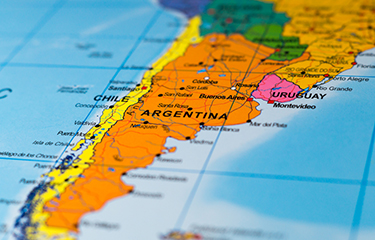With the worldwide seafood market affected by lower consumption and purchases due to the effects of COVID-19, Argentina’s fishing sector is set to see exports drop by 30 percent this year, bringing in some USD 1.3 billion (EUR 1.2 billion) compared to the USD 1.86 billion (EUR 1.7 billion) recorded for 2019, according to estimates from the Interchambers of the Argentine Fishing Industry (Intercámaras).
Exports to the main destination markets alone – China, Spain, the U.S., and Italy, which have been “strongly affected by the pandemic” – are expected to fall by USD 324 million (EUR 295 million) in 2020, said Intercámaras, which groups together nine related associations throughout Argentina, including the Council of Argentine Fishing Companies (CEPA) and the Argentine Chamber of Deep Sea Fishing Vessel Owners (CAABPA). It added that its estimates consider “an optimistic scenario,” in which sector exports this year would be comparable to levels reached in 2010.
Fishing captures dropped 20.9 percent in the first quarter, reaching 174,599 metric tons (MT) in 2020 compared to 220,804 MT in 2019, the association said in a presentation, with captures falling 27.2 percent in the month of March alone. In year-over-year comparisons, the capture of Argentina’s three main fishing products – squid, Argentine hake, and prawns – were down 30.5 percent, 10 percent, and 25.7 percent, respectively; to 61,009 MT, 49,591 MT and 33,788 MT in Q1 of 2020.
“We’re in a period of uncertainty as to whether we will be able to work as normal. Up to now, it has been very difficult to assemble boats and lift anchor, with greater delays and costs, even though the activity [fishing] has been declared essential,” Eduardo Boiero, president of the Chamber of Shipowners of Fisheries and Freezers of Argentina (CAPECA), told El Cronista. “The price of fish in general has dropped more than 30 percent, and we still don’t know how this will end up. There is no consumption in our main markets, due to their closure and the lack of tourism."
Intercámaras highlighted the dire situation in prices and in volumes exported during the first two months of the year in several of its key markets, including:
- Prawn export values dropped 38 percent to China, 28 percent in Spain and 24 percent in Thailand.
- Total exports of squid fell 42 percent to China, 8 percent to Spain, and 41 percent to Japan.
- Shipments of Argentine hake to the U.S. fell 19 percent, while the price of this fish dropped as much as 24 percent in Russia due to the weakened ruble, although exports of Argentine hake are mostly within Latin America “so the worst is yet to come” as the region was hit by the coronavirus outbreak at a later date than more-developed markets.
- The price of black hake dropped 20 percent in the U.S. market, which has also been closed to spider crab imports – the main market for this product.
“Sooner rather than later, the negative impact on the sector will be felt more strongly, both on the price side and in the volumes exported,” the association predicted.
However, Argentina’s fishing sector had already been performing poorly, and the impact of Covid-19 in the first quarter of the year may have just accentuated a negative trend. Compared to 2018, the country last year saw a drop in activity, both in catchment volume and in value exported.
Total exports last year reached USD 1.67 billion (EUR 1.52 billion), falling 10.2 percent from 2018’s record levels of USD 1.87 billion (EUR 1.7 billion), and approaching 2017 levels. Within fishing exports, its main subcategory – crustaceans and mollusks – fell 17.8 percent from 2018 to USD 1.33 billion (EUR 1.21) in 2019, according to information from Intercámaras.
Comparing the first quarter of 2020 with that of 2018, exports, by volume, fell 70.9 percent to China, 13 percent to Spain, and 25.1 percent to the U.S.
Fishing is Argentina's eighth-largest export sector, representing 2.9 percent of GDP, with a presence in more than 85 international markets. Some 22,000 people are employed in the sector throughout Argentina’s five provinces with coastline: Buenos Aires, Río Negro, Chubut, Santa Cruz, and Tierra del Fuego.
In this context, the fishing sector has called for government help during the pandemic, La Nación reported.
"In view of this very serious situation, the entire sector has requested that the government … seek the necessary mechanisms [for fishing companies] to at least be able to resume activity," industry actors were quoted as saying. "Unfortunately, the days continue to pass, the costs are accumulating and the companies' question these days it is not how much money they will lose, but how much longer they will be able to bear those losses before disappearing."
Photo courtesy of timyee/Shutterstock







